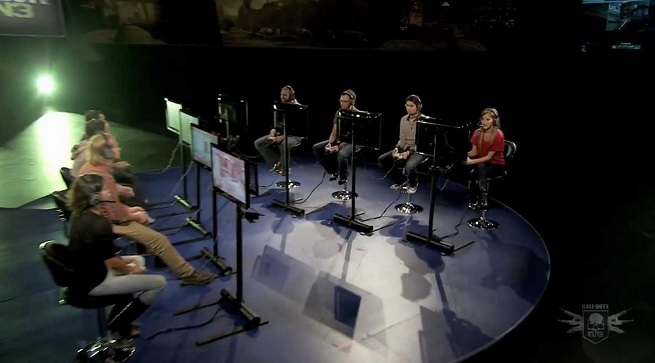GamesBeat: Do you enjoy living an online life?
Ezarik: I do. It’s one of those things—People say, “Oh my God, you totally post everything there.” No. There’s a lot of stuff happening behind the scenes. I don’t just shoot videos and post them. If it was that easy everyone would be doing it.
GamesBeat: Where have you been able to travel? Has it basically taken you around the world?
Ezarik: For Call of Duty we just did coverage for the Call of Duty tournament championships. We went to Australia to cover their regionals and interview their players. We went to London and Paris and Chicago, and finally just two weeks ago we finished the Call of Duty million-dollar championship. Being able to work on a project like that is a lot of fun – working with one of my favorite brands and one of my favorite games. I do a lot of hosting as well, so tying all that in and interviewing the players about their careers as professional gamers is pretty much the perfect project.
GamesBeat: The Internet is a two-way street now. How do you deal with its breed of crazies? Do you have any thoughts on how companies should deal with that?
Ezarik: It is scary. A lot of times you have to take legal action, because a lot of times these people don’t realize that what they’re doing is extremely illegal. You cannot be sending out death threats. You can’t be sending SWAT teams to people’s houses. You’re taking away resources that police forces should be using to do their real jobs. And yet they’re showing up at live streamers’ houses for the sake of someone’s entertainment.
Because we put so much of our lives out there, people sometimes feel personally connected to us. They feel like they can just show up at someone’s house and say, “Hey, I’m here.” No, you can’t really do that. You just have to be really careful. It’s a bigger issue that we can really get into here, I think.
GamesBeat: People still want to have conversations, though. That can lead to fans becoming more enthusiastic about a product or whatever it is that’s being marketed.
Ezarik: For sure. Just having that interaction is awesome. I think I tweeted a podcast that Target replied to, and I’m like, “I can’t believe Target just tweeted me. I shop at Target all the time. That’s where I get everything. And they just sent me a tweet.” And yet we’re really just having a conversation. Sometimes you don’t realize what that can mean to somebody. For me, I’m just having a conversation with people who watch my videos and have some of the same interests. It’s been fun.
One project that’s just come to fruition is the relaunch of my own website, where we can have those sorts of conversations in a safe environment. I control pretty much everything that’s happening there. It’s nice to have a safe place where people can go and feel welcome and not be quite so out in the open the way they are on Facebook or Twitter.
GamesBeat: Everybody’s aware that a lot of advertising money is moving online. It seems like being an Internet personality can be a good business these days.
Ezarik: I’ve always been an entrepreneur, I guess. I was running my own business even before I started doing YouTube videos. One thing that a lot of people don’t realize is that there’s a lot that goes into this. If you have someone shooting and editing and doing all this stuff for you it can be really easy, but that’s not really what YouTubers do. Most of us do everything ourselves. We take pride in the fact that the content we post is something we created. I shot it and edited it. It’s exactly what I want you to see. That’s the difference between us and a lot of more traditional ad-industry content. Kids today are watching this content, though, and they don’t actually care how they get it. For them, TV and the internet are basically the same thing.
GamesBeat: Besides Call of Duty, what other games are you a big fan of?
Ezarik: I play Destiny as well. I just had to take a break. I said, “I just got my alpha four days straight. I need to go outside.” I also love a lot of old Nintendo games, a lot of PC games, especially Minecraft. I think everyone loves Minecraft. Really, I stretch from iPhone games to hardcore first-person shooters. The gaming industry in general is so interesting now. My mom is playing video games on her phone. There’s a blurry line around what’s considered “gaming.”
GamesBeat: Where do you want games to go?
Ezarik: I love mobile gaming. I love being able to take everything with me. If I start a game on my Wii U, say, I want to be able to pick it up on my DS and take it with me when I’m traveling. Any time I travel I end up bringing my Xbox with me, but any way I can make it smaller and more portable and easier to take with me is going to be huge. I used to go to LAN parties in high school and we’d have to lug our computers to people’s houses. Now, if I can take a little Amiibo or a Skylander over to a friend’s house and have an entire game saved there, that’s awesome.
GamesBeat: Where would you like your career to go next?
Ezarik: I’m up for anything, really. If it sounds like a fun project you can usually count me in. We’re working on a movie that should be out for Halloween, so I’m excited about that. I have a book coming out June 2. It’s kind of crazy how all this is coming together, after so many years of just being on the internet. From the outside it may seem like it happened overnight, but definitely not – not for me or a lot of these other creators who’ve been doing it since the beginning.
GamesBeat: It’s snowballing now, though. You’re in a group of essential game marketing people.
Ezarik: I hope so. It’s something I love, and it’s so cool to see people embracing it.
VentureBeat's mission is to be a digital town square for technical decision-makers to gain knowledge about transformative enterprise technology and transact. Learn More




